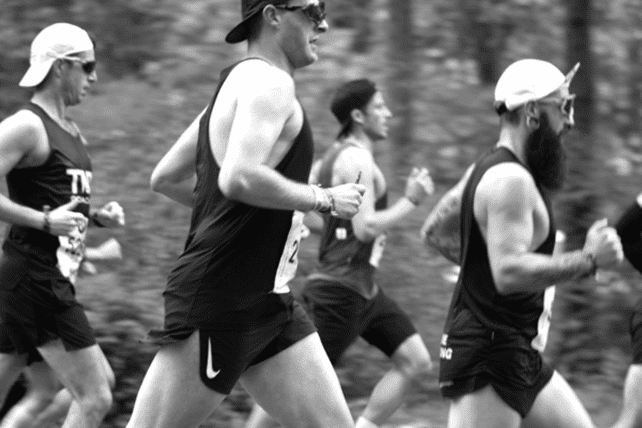AURORA, Ill. (RNS) — Marcos Hernandez says he has spent most of his life running.
Mostly trying to get away from God.
“I’ve been running from him — running with the devil,” says Hernandez, a resident of Wayside Cross, a Christian recovery center and shelter in the Chicago suburbs.
These days, Hernandez, who says he is four years sober, is running for a different reason. If all goes to plan, he and seven other Wayside Cross residents will toe the line at the Fox Valley half-marathon in St. Charles, Illinois, in a few weeks — with hopes of finishing the 13.1-mile race.
For the past two months, Hernandez and other residents have been waking up at 5 in the morning, three days a week, as part of Up and Running Again, a national program that helps residents of homeless shelters and rescue missions train for half-marathons. Since 2010, more than 1,300 participants have finished a half-marathon through the program, which has partnerships with nonprofits in 10 locations, from Washington state and Los Angeles, to Knoxville and Aurora.
The idea is to use running and friendship as tools for transformation, said the Rev. Bruce McEvoy, a pastor and avid marathoner who serves as a volunteer coach for the program.
“Together we can do hard things,” McEvoy said, who has run 35 marathons and hopes to run one in every state.
The program is simple but intense. For 12 weeks, participants like Hernandez run three days a week — two shorter runs on Tuesdays and Thursdays, followed by a long run on Saturday. Participants are paired with volunteer coaches who give tips and motivation while running side by side.
“When you’re running shoulder to shoulder, you’re sharing life with one another,” said McEvoy, the pastor for local and global impact at Chapel Street Church, an evangelical congregation with four locations in Chicago’s suburbs. The church has long had ties to Wayside Cross, a nearly century old riverfront shelter and recovery center in Aurora, founded as a result of an evangelical crusade by baseball player-turned-preacher Billy Sunday in 1927.
Most of the people Wayside Cross works with have dealt with addiction and homelessness. The program provides food and housing for free. Residents are required to attend classes and chapel and to have a job — first for the ministry and then outside.
Four years ago, McEvoy approached leaders at Wayside Cross about starting the running program after a friend at church told him about it. They jumped at the idea, he said.

